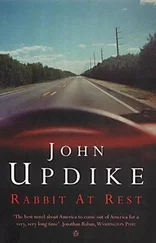John Updike - Rabbit Remembered
Здесь есть возможность читать онлайн «John Updike - Rabbit Remembered» весь текст электронной книги совершенно бесплатно (целиком полную версию без сокращений). В некоторых случаях можно слушать аудио, скачать через торрент в формате fb2 и присутствует краткое содержание. Жанр: Современная проза, на английском языке. Описание произведения, (предисловие) а так же отзывы посетителей доступны на портале библиотеки ЛибКат.
- Название:Rabbit Remembered
- Автор:
- Жанр:
- Год:неизвестен
- ISBN:нет данных
- Рейтинг книги:5 / 5. Голосов: 1
-
Избранное:Добавить в избранное
- Отзывы:
-
Ваша оценка:
- 100
- 1
- 2
- 3
- 4
- 5
Rabbit Remembered: краткое содержание, описание и аннотация
Предлагаем к чтению аннотацию, описание, краткое содержание или предисловие (зависит от того, что написал сам автор книги «Rabbit Remembered»). Если вы не нашли необходимую информацию о книге — напишите в комментариях, мы постараемся отыскать её.
Set 10 years after Harry "Rabbit" Angstrom's death, Rabbit Remembered returns listeners to the small Pennsylvania town where Harry's widow, Janice, and his son, Nelson, still reside. They are faced with a surprise when Annabelle, Harry's 39-year-old illegitimate daughter, arrives on the scene, bringing with her ghosts from the past.
Rabbit Remembered — читать онлайн бесплатно полную книгу (весь текст) целиком
Ниже представлен текст книги, разбитый по страницам. Система сохранения места последней прочитанной страницы, позволяет с удобством читать онлайн бесплатно книгу «Rabbit Remembered», без необходимости каждый раз заново искать на чём Вы остановились. Поставьте закладку, и сможете в любой момент перейти на страницу, на которой закончили чтение.
Интервал:
Закладка:
"Love does seem a bit much," Janice allows.
"I'll go look her up myself, then," Nelson threatens. "A. Byer. You say she's the only one in the phone book."
"Nelson, believe me," Ronnie says, trying to act the father, "there's nothing in it for you but heartbreak. You've been a victim of Harry Angstrom since you were two, why look for more agony?"
"It wasn't only agony," Nelson argues. "There were positive elements in the relationship."
Janice chimes in, "Harry loved Nelson, it frustrated him that he could never express it properly."
"Oh come on, you bleeding hearts," says Ronnie, in an exasperated voice strong and angry enough to end the conversation. "I knew Rabbit longer than either of you. I knew him since we were kids in knickers snitching penny candy off the counter at Lennert's Variety Store. That conceited showboat never loved a soul outside his own thick skin. His mother had spoiled him rotten."
Chapter 2
"Hello?"
"Yes?" Wary. Single women have to be, the world full of phonecreeps."Is this Annabelle Byer?"Yes." Slightly reassured to be named."This is Nelson Angstrom."Oh! Nelson! How nice!"A pause; he had thought from her enthusiasm she might go on a little more. He says, "My mother described your visit."Did she? I wasn't sure it went very well."Oh, yeah. She liked you. She just isn't sure what to make of the general situation. It took her by surprise."Me, too. I mean, I was surprised at first, when my mother told me. It shouldn't matter, my being a grown woman and all."Oh, but it has to matter." He feels more secure, as the conversation tips toward the therapeutic."How do you feel about it?" she asks."I feel good," he says. "Why not? The more the merrier, isn't that what they say? Listen. I was wondering if we could have lunch sometime. Just to look each other over." That was one sentence too many, but then he might as well get the curiosity issue on the table.
She hesitates. Why would she hesitate, when it was she who had come out of the woodwork? "I think I'd like that."
"Tomorrow? Next day? What's your schedule?" he says. "I work at Eighth and Elm, there's a little restaurant opened up in the block on Elm toward Weiser, it's called The Greenery, but don't be put off, it's decent enough, soups and sandwiches and salads, kind of neo-New Age, but they have booths for a little privacy."
"Sounds cute," she says. That slightly puts him off. This may be an airhead, sister or not. After all, what does she have for genes? Nothing that promising. She asks, "Would you mind not until next Thursday? Until then I'm on day duty, it's an Alzheimer's patient who needs round-the-clock."
"Great," he says. "Thursday the sixteenth. Twelve-thirty O.K.? I'll be waiting outside. Medium height, short haircut these days."
"I'm," she began to say, then giggled, not knowing how to describe herself. "I'll be in fat white shoes."
Wouldn't you know, they have picked the one day in September when a hurricane called Floyd is supposed to hit. All sorts of wind damage and heavy flooding in North Carolina, and then predicted to come right up the Chesapeake into southeastern Pennsylvania. But these forecasters are paid to whip everybody up, and though the wind kept him awake last night, rattling the window sashes Ronnie had painted last summer and swishing sheets of rain across the asphalt-shingle roof that supposedly ought to be replaced if they want to keep their equity in the house, the morning isn't so bad that cars aren't moving on Joseph Street, slowing down to go around a medium-size maple branch that broke and crashed last night in his sleep. He didn't hear the noise; he slept better than he thought. The branch lies in the center of the asphalt like a big piece of road kill, its leaves' pale undersides up and already wilting.
Nelson thinks of phoning Annabelle to cancel but he doesn't want Mom and Ronnie to know he has this planned. Instead he phones his boss, Esther Bloom, who lives in Brewer, and she tells him the Center will be open at least until noon. "These people have nowhere else to go, Nelson. A weather event like this brings up survival issues they may need to process."
On the way into town he sees two highway crews, with flashing lights and cops in orange slickers directing traffic, cleaning up fallen trees with chain saws-an old willow that had sunk its roots in the roadside ditch by the failing mall with the four-screen cineplex and, on the other side of the viaduct, where 422 enters Brewer and becomes Cityview Drive, a gorgeous big tulip poplar at the edge of the park. The park has always struck Nelson as sinister, slightly. Tough minority kids hang out among the trees, and there is a dim association with the time his father had left home and lived not far from here in the city, on Summer Street. The World War II tank near the tennis courts has been recently taken away, and a pretty little white-and-green bandstand built, as part of downtown renewal, though it serves mostly to collect graffiti and to shelter thugs from the weather and has never held a concert that Nelson can remember. The car radio is full of this gunman, one more straight-shooting psychotic, who killed seven and then himself in some Texas Baptist church, and terrorist blasts in Moscow killing dozens, and an interesting item which he doesn't quite catch about cocaine addiction linked to a build-up of certain proteins in the brain-it hadn't been his fault, it was brain chemistry-and then another medical item, which interests him less, about how hot tubs may help diabetics. The Phillies beat Houston eight to six in ten innings, but they still aren't going anywhere, not in the middle of September. As he drives across the park's most open stretch, wind shakes his car so hard that he tightens both hands on the steering wheel.
In Brewer around Eighth and Elm the buildings cut down on the wind somewhat. It's an older area, where commercial meets residential. A former hat factory stands empty but for one little photocopy-and-offset-printing establishment named PRINTSMART in a lower corner. The treatment center occupies the basement floor of what used to be a three-story elementary school, grades K through six. The parking lot consists of a strip of diagonal places at the side of the building where the neighborhood residents stick their rusty heaps at night, right across two spaces, neglecting to wake up in time to take them away. The neighborhood is shabby but not dangerous, like most of the clients.
As Nelson gets out of his Corolla he sees a sky darkly bruised in patches above the brick cornices, the clouds layered and shredding as they slide swiftly sideways, but the rain appears to be stopping and the air brightens as if to clear. People on the sidewalks, especially the young women who work in the glass courthouse annex a block away, hugging themselves in short sleeves and not even carrying umbrellas, don't appear to know they're almost in a hurricane. Across Eighth Street a cheap big orange facade saying DISCOUNT OFFICE SUPPLIES has been attached above the doorway to an old stationery store that Nelson remembers still smelling of gum erasers and ink eradicator before everything was bubble-wrapped and packaged for bulk sales; the sign makes a shivery noise as a spatter of bright raindrops sweeps by. Farther down Eighth an old-timey, routed, gold-lettered Tavern sign swings back and forth. Maybe he should have suggested that as the place to eat-a little racier and more cavelike, with a liquor license -but he obscurely wanted to keep his meeting with his sister sober and pure: a solemn occasion.
The radio said Governor Ridge was considering declaring an emergency and sending all state and local workers home, but inside the Center the staff has shown up, all but Andrea the art therapist, who lives beyond Pottstown, almost on the Main Line.
Читать дальшеИнтервал:
Закладка:
Похожие книги на «Rabbit Remembered»
Представляем Вашему вниманию похожие книги на «Rabbit Remembered» списком для выбора. Мы отобрали схожую по названию и смыслу литературу в надежде предоставить читателям больше вариантов отыскать новые, интересные, ещё непрочитанные произведения.
Обсуждение, отзывы о книге «Rabbit Remembered» и просто собственные мнения читателей. Оставьте ваши комментарии, напишите, что Вы думаете о произведении, его смысле или главных героях. Укажите что конкретно понравилось, а что нет, и почему Вы так считаете.












